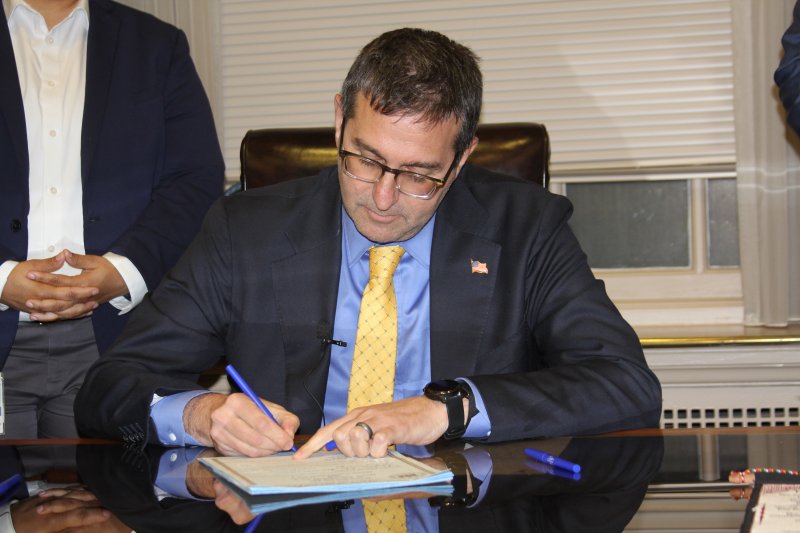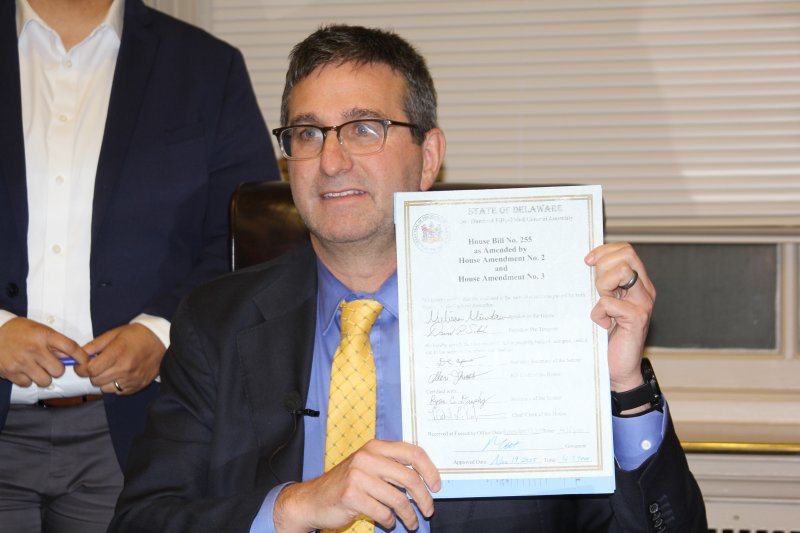A bill to separate Delaware’s corporate tax code from federal code is now law, despite concerns aired by Senate Republicans Nov. 19 that the change could further erode Delaware’s historically corporate-friendly status.
Gov. Matt Meyer signed House Bill 255 following its 14-6 passage in the Senate. A week earlier, the bill passed the House 26-13.
Meyer had pushed for an extraordinary legislative session over concerns of a $400 million shortfall if Delaware continued to follow federal tax code, which allows companies to go back to 2022 and write off expenses in bulk for one tax year under bonus depreciation. Many start-up companies have said the ability to write off those expenses helps them when cash flow is tight, and allows their companies to expand.
In signing the bill, Meyer said decoupling from the federal tax code will help Delaware’s budget.
“This bill takes our largest problem – you look just mathematically – a problem that had nothing to do with any prior budgets of our state, but had everything to do with action at the federal level, and it addresses that,” he said. “Without doing this, we would've had to make some really serious decisions about cutting services or increasing other revenue sources to continue to deliver for Delawareans.”
Meyer said Delaware still faces potential cuts at the federal level that could add costs to the state.
“We’re not out of the woods yet … when you look at the [Delaware Economic Financial Advisory Committee] numbers, the actual projections for our state, it was the most serious and needed to be addressed immediately,” he said.
Republicans, however, questioned rushing to pass the bill instead of trying to rein in spending, and opined what kind of message it will send to companies looking to incorporate in Delaware.
Before the vote, Sen. Brian Pettyjohn, R-Georgetown, referred to the session as political theater and encouraged members of the Democrat-controlled Senate to fully consider their decisions.
“While it might be the expedient thing to do for our state budget at this time, one of the concerns I have is how this would appear to companies that might be looking to come into Delaware and to invest,” he said.
Senate Majority Leader Brian Townsend, D-Newark, acknowledged the timing of the extraordinary session.
“There has been a lot that has not been clear these past few weeks, based on how this rolled out and how it was framed in a way that I don’t think was particularly productive with regard to really trying to dig in and get this right, and have people understand what this is really about,” he said.
However, Townsend said, the change in federal tax law has left a potential budget deficit that needs to be addressed in order to cover funding for state programs and avoid shifting around state revenue.
Although the bill allows companies to write off $2.5 million in capital investment per year, business owner and House Minority Leader Sen. Gerald Hocker, R-Ocean View, said that kind of money does not go far.
“I couldn’t start a new supermarket with $2.5 million allowed,” he said. “The perceived message we’re sending is, why would you locate in Delaware?”
Hocker said he predicts companies will soon leave New York City, and Delaware would be a great place for them to set up shop, but unfriendly business decisions such as the tax decoupling bill may prevent them from coming.
Already, recent Chancery Court decisions ultimately drove Elon Musk’s Tesla and SpaceX out of Delaware and into Texas. Dropbox and TripAdvisor soon followed, and Coinbase recently announced it is leaving Delaware for Texas over “unpredictable outcomes” by Delaware’s Chancery Court, and a more business-friendly atmosphere in Texas, according to published reports.
Corporate franchise fees make up about a third of Delaware’s budget, roughly $2 billion, with a smaller amount coming from taxes affected by the bonus depreciation under President Donald J. Trump’s One Big Beautiful Bill Act, from which Delaware has now decoupled.
Pettyjohn said when he hears the term big business, he views it not as a pejorative, but as potential job creators that could fill the economic hole resulting when car and chemical manufacturing left the state.
“We have to think of the macro economic picture here,” he said. “I want our economy to grow and broaden.”
Under the bill passed, decoupling from the federal tax code is not permanent, and the state would recouple in 2030.
Melissa Steele is a staff writer covering the state Legislature, government and police. Her newspaper career spans more than 30 years and includes working for the Delaware State News, Burlington County Times, The News Journal, Dover Post and Milford Beacon before coming to the Cape Gazette in 2012. Her work has received numerous awards, most notably a Pulitzer Prize-adjudicated investigative piece, and a runner-up for the MDDC James S. Keat Freedom of Information Award.























































